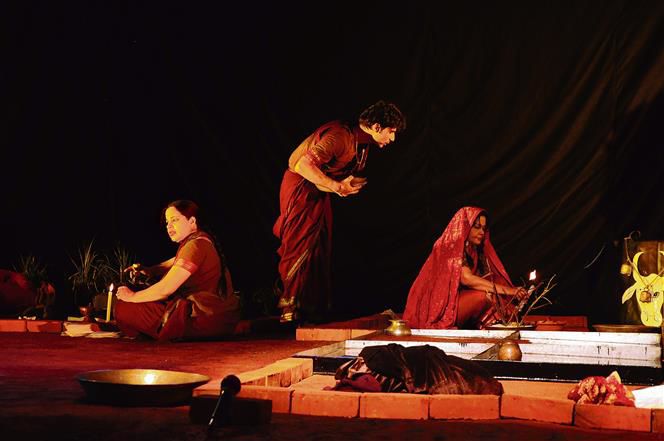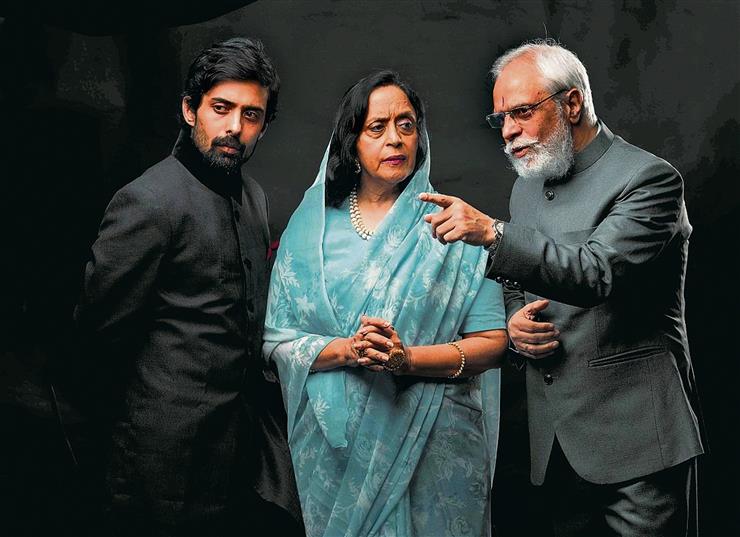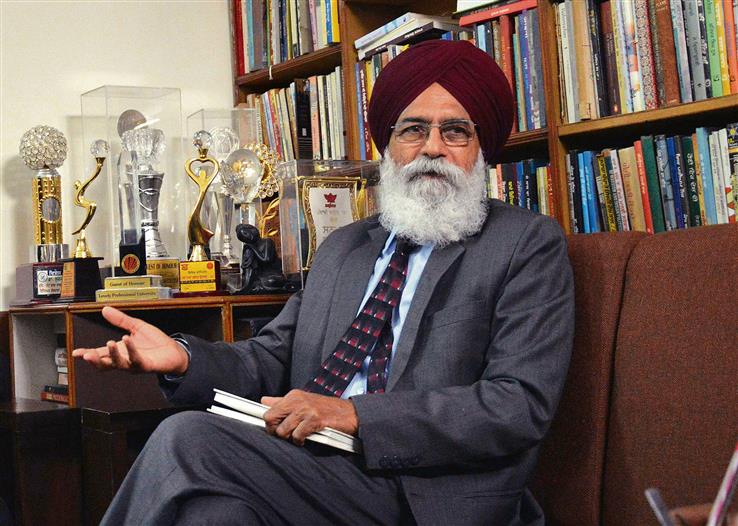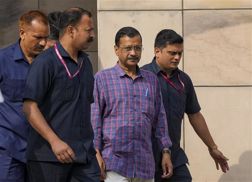
In Girish Karnad’s Kannada play ‘Nagamandala’, myth and magic dovetail to tell a contemporary story. Here, actors of The Company theatre group perform the play in Punjabi.
Neelam Mansingh Chowdhry
“All translations are an attempt to arrive at some primal language that the whole mankind once shared and seems to have lost — maybe after Babel — and each translation is a call into the ‘forest of language’ so that we get an echo. The echo may not be the same as the original sound, just as our image in the mirror or water is not us, yet it reassures us of our own existence.” — Walter Benjamin
We are translating all the time in India, mixing words and syntax from one language to another organically and naturally. ‘Let’s eat rajma-chawal for dinner’, ‘nimbu ka pickle’... Sentences like these are part of our daily vocabulary, along with sentences that have a smattering of foreign words — cliché, déjà vu, chutzpah, words that pepper our conversations along with the presence of Urdu and Persian words like fark, farzi, mubarak… the list is endless. They slip in and cross-pollinate, enriching language in the process.

In the streets of Mumbai, hawkers sell their wares in English, Spanish or Arabic to connect with the swarm of tourists who travel from across the world. Translation then becomes a lucrative necessity to attract customers and make a tidy penny. Translation is not only a creative activity, but also a glue that holds India together by opening the doors to other regions, cultures, religions and literature. It is porous and dissolves walls of distrust and seals schisms.
We are familiar with the plays of Henrik Ibsen, Anton Chekhov, William Shakespeare, Bertolt Brecht, Badal Sircar and Girish Karnad, as also the classics from Sanskrit and Greek through the act of translations.

Translation is not something you do when you want to make one language understood by another. That could be considered as substitution. Translation is a creative act in and of itself, and not just an intermediary, interpretive activity. It is a way of finding resonance, not just between words, but between the hidden cultural codes that are carried across the narrative. What translation brings to us is the narrative of an alien culture into our minds and hearts through a familiar language. The familiarity of the language evokes a familiar cultural horizon for the audience. However, this familiarity carries within it fresh emotional sensations that are both recognisable and unexpected.
I recall reading Girish Karnad’s play ‘Nagamandala’ and being completely fascinated with the way myth and magic dovetailed to tell a very contemporary story. I was also familiar with the poetry of Surjit Patar, the eminent poet, and had also read his translation of Federico Garcia Lorca’s ‘Blood Wedding’ and knew that if anyone could translate ‘Nagamandala’ into Punjabi, it was Patar.
When I asked him to translate it from the English transcript, he was extremely hesitant. He discussed his initial reluctance, his disconnect with the snake imagery and the problems of transporting a folktale from Karnataka to a Punjab village:
“Unfamiliar with the language of theatre, I was completely thrown off balance by the snake imagery in the text. Having been nurtured in the tradition of ‘realistic drama’, I presumed that the snake was a physical requirement for staging the play. I kept grappling with the issue of how to show a snake on stage until it struck me that this was for the director to resolve. The other area that confused me was that I was not familiar with the language of theatre that this play was written in. How can flames be made human? How does an intangible element like a story become a character? In most writings that existed in Punjab, at least in contemporary playwriting, folktales with layered and dense imagery had not made an appearance.
The word ‘chhaleda’ (illusionist) became my starting point and helped me in interpreting the images of the play. It also provided me the tool to get to the heart of the story. To shift the play from a village in Karnataka to Punjab was easy as the characters looked familiar. I had met the blind women, the husband, the brutalised wife and members of the panchayat many times. These characters had certainly entered my universe during many stages of my life and seemed familiar.”
On seeing the Punjabi version, Girish Karnad generously remarked that he was going to translate the Punjabi ‘Nagamandala’ into Kannada!
I understood from this experience that translation cannot be viewed in linguistic terms alone; it also addresses issues, how cultures collide and resonate, create parallels, disconnects and connects.
The translated text belongs both to the playwright and the translator. We cannot assume that the translator is transferring the visual, aural and tactile resonance of the original text by drawing parallels that are simultaneous to the source from where the text has been taken. The translator knows that the text can only be realised by positioning it in its own local vernacular and regional reality, while engaging with the nuances of the language to which it is being translated.
The translator reassembles the plot in accordance with the logic of the situation and develops the characters through the time and space which fits in the ideological concerns of the translator and the director of the play being translated. This is not to suggest that the play will not resonate with the echoes of the source material, but it is to state that a translation of a text that is transferred from one language into another will have a texture and resonance that will mirror its own specific reality. Hence, it can’t be just a translation from one language into another, but needs to confront and communicate situations and characters that are not only separated by the boundaries of language, but also through geography, time and specificities of their cultural configurations.
I recall an incident during the making of a play from Rabindranath Tagore’s short story ‘Streer Patra’. A Bengali friend was excited to see the rehearsal. Mrinal, the protagonist, defied social codes and left her marital home due to a loveless marriage. Patar transported the Bengali home into a Punjabi household without losing any of the narrative essence. The friend was aghast that Punjabi songs had replaced Rabindra Sangeet and ilish macher jhol was roti-dal in our version.
The process of translation will always be imagined by different directors in different ways at different points of time. To take a text and assign a single interpretation is to impose a limit on that text. Every work is written here and now, and with each re-reading, fresh thoughts emerge. The origin of meaning does not lie exclusively in the language itself, but its impact on the actors and how it is internalised. From text to performance is a journey that is undertaken by the director and the actors and one knows that any good writing contains multiple layers and meanings.
Join Whatsapp Channel of The Tribune for latest updates.


























